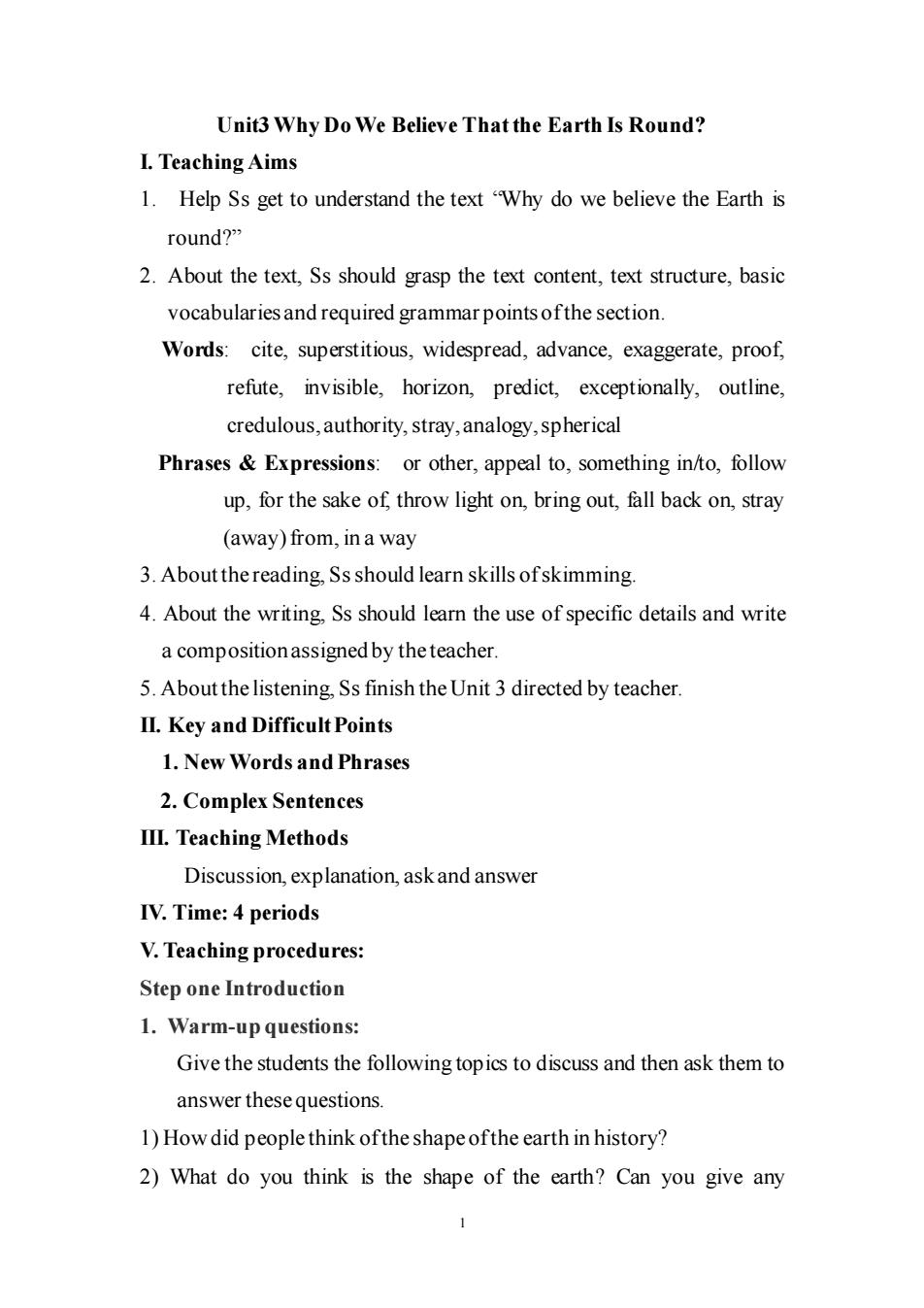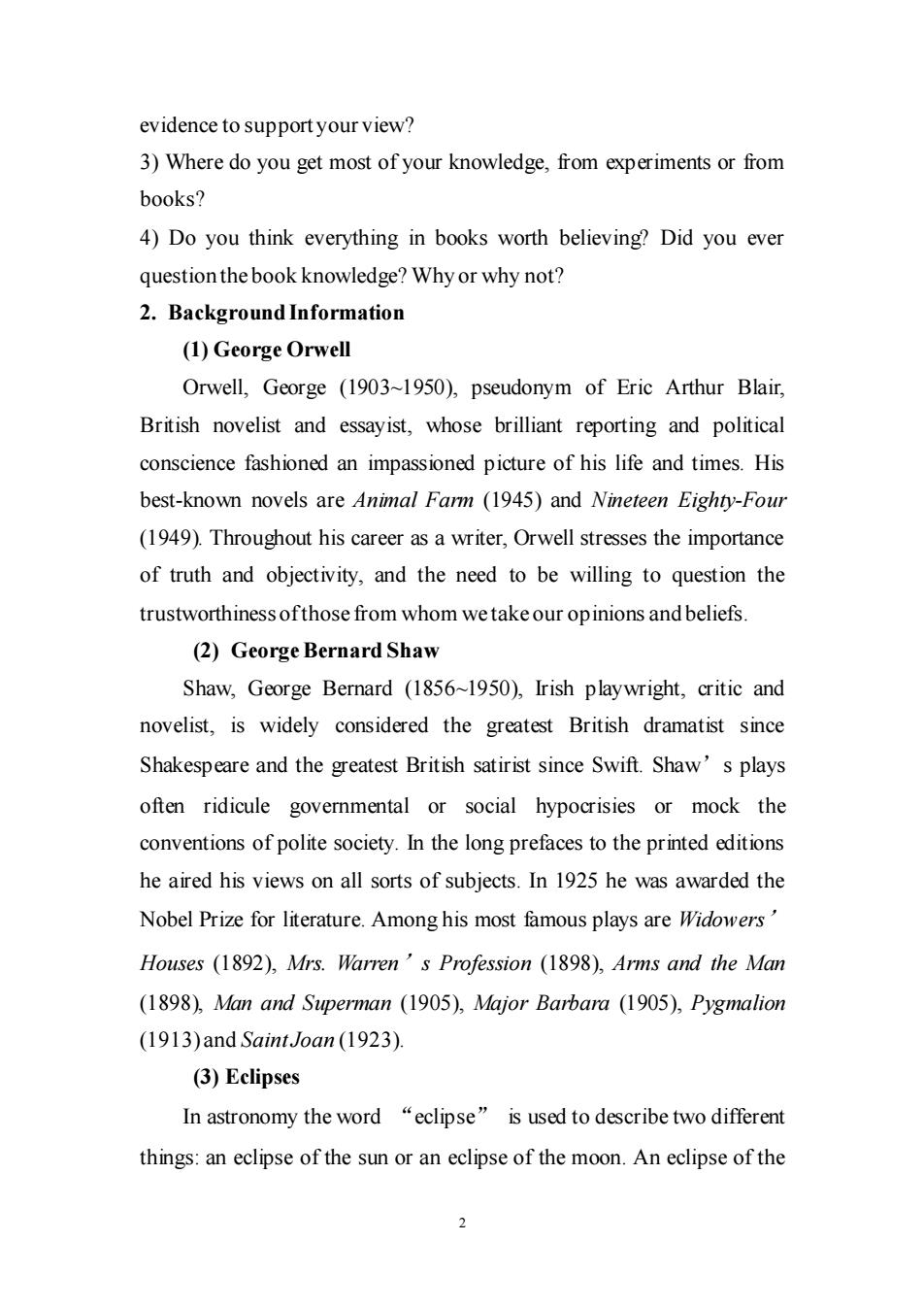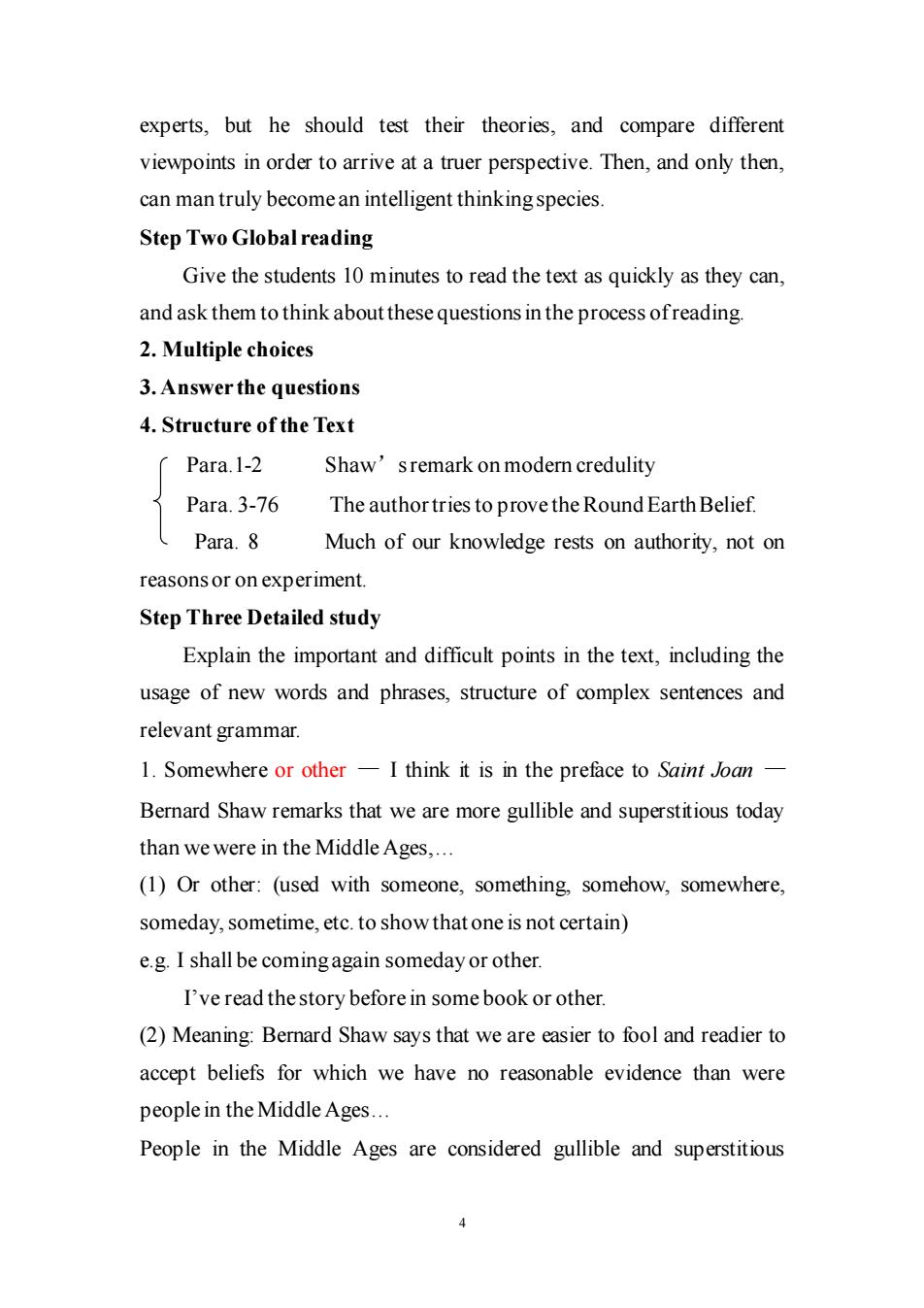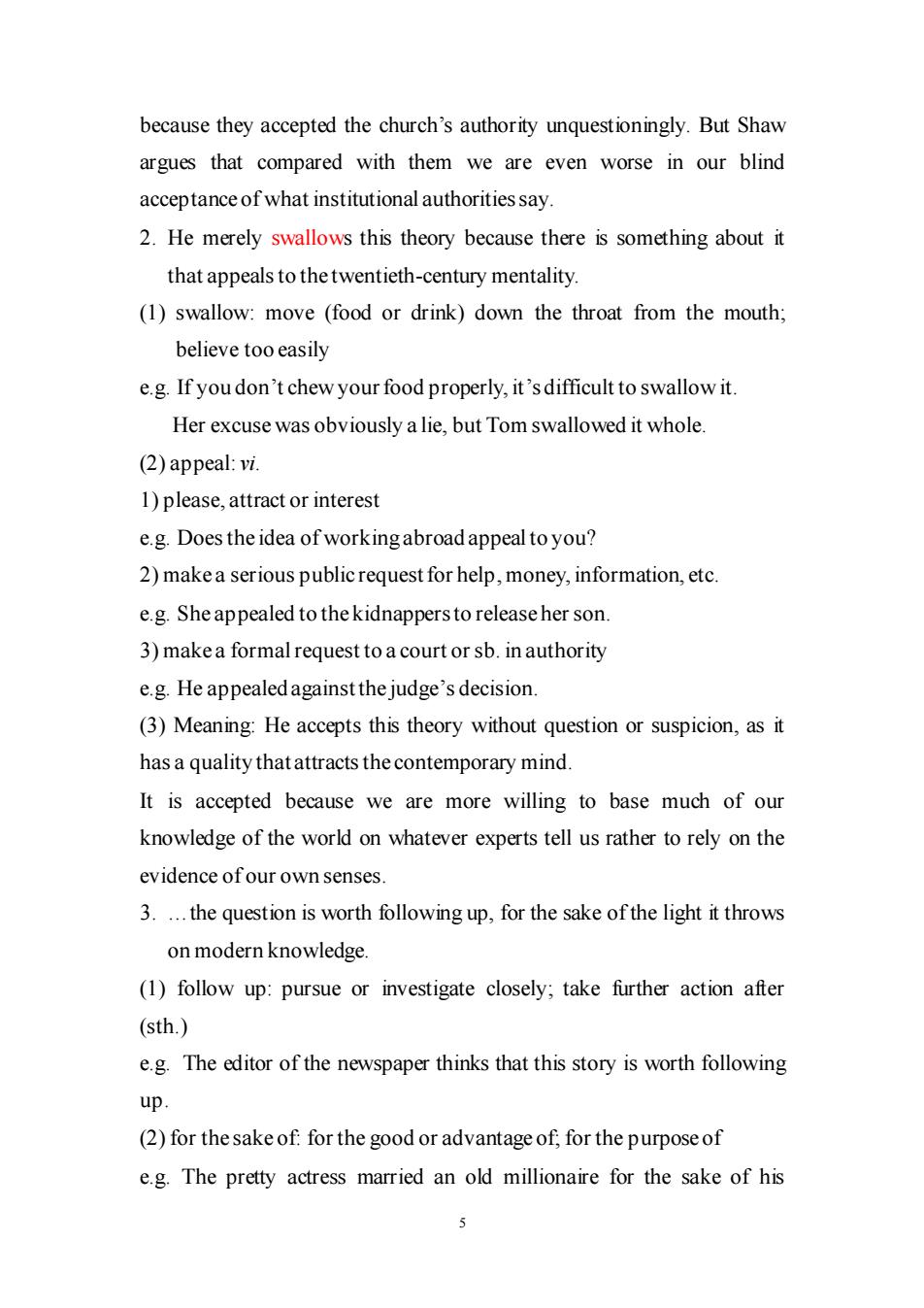
Unit3 Why Do We Believe That the Earth Is Round? I.Teaching Aims 1.Help Ss get to understand the text "Why do we believe the Earth is round?" 2.About the text,Ss should grasp the text content,text structure,basic vocabularies and required grammar points ofthe section. Words:cite,superstitious,widespread,advance,exaggerate,proof refute,invisible,horizon,predict,exceptionally,outline, credulous,authority,stray,analogy,spherical Phrases &Expressions:or other,appeal to,something in/to,follow up,for the sake of throw light on,bring out,fall back on.stray (away)from,in a way 3.About the reading.Ss should learn skills ofskimming. 4.About the writing.Ss should learn the use of specific details and write a compositionassigned by the teacher. 5.About the listening,Ss finish the Unit 3 directed by teacher II.Key and Difficult Points 1.New Words and Phrases 2.Complex Sentences III.Teaching Methods Discussion,explanation,ask and answer IV.Time:4 periods V.Teaching procedures: Step one Introduction 1.Warm-up questions: Give the students the following topics to discuss and then ask them to answer these questions. 1)How did people think ofthe shape ofthe earth in history? 2)What do you think is the shape of the earth?Can you give any
1 Unit3 Why Do We Believe That the Earth Is Round? I. Teaching Aims 1. Help Ss get to understand the text “Why do we believe the Earth is round?” 2. About the text, Ss should grasp the text content, text structure, basic vocabularies and required grammar points of the section. Words: cite, superstitious, widespread, advance, exaggerate, proof, refute, invisible, horizon, predict, exceptionally, outline, credulous, authority, stray, analogy, spherical Phrases & Expressions: or other, appeal to, something in/to, follow up, for the sake of, throw light on, bring out, fall back on, stray (away) from, in a way 3. About the reading, Ss should learn skills of skimming. 4. About the writing, Ss should learn the use of specific details and write a composition assigned by the teacher. 5. About the listening, Ss finish the Unit 3 directed by teacher. II. Key and Difficult Points 1. New Words and Phrases 2. Complex Sentences III. Teaching Methods Discussion, explanation, ask and answer IV. Time: 4 periods V. Teaching procedures: Step one Introduction 1. Warm-up questions: Give the students the following topics to discuss and then ask them to answer these questions. 1) How did people think of the shape of the earth in history? 2) What do you think is the shape of the earth? Can you give any

evidence to supportyour view? 3)Where do you get most of your knowledge,from experiments or from books? 4)Do you think everything in books worth believing?Did you ever question the book knowledge?Why or why not? 2.Background Information (1)George Orwell Orwell,George (1903~1950),pseudonym of Eric Arthur Blair, British novelist and essayist,whose brilliant reporting and political conscience fashioned an impassioned picture of his life and times.His best-known novels are Animal Fam (1945)and Nineteen Eighty-Four (1949).Throughout his career as a writer,Orwell stresses the importance of truth and objectivity,and the need to be willing to question the trustworthiness ofthose from whom wetakeour opinions and beliefs. (2)George Bernard Shaw Shaw,George Bernard (1856~1950),Irish playwright,critic and novelist,is widely considered the greatest British dramatist since Shakespeare and the greatest British satirist since Swift.Shaw's plays often ridicule governmental or social hypocrisies or mock the conventions of polite society.In the long prefaces to the printed editions he aired his views on all sorts of subjects.In 1925 he was awarded the Nobel Prize for literature.Among his most famous plays are Widowers Houses (1892),Mrs.Warren's Profession (1898),Arms and the Man (1898),Man and Superman (1905),Major Barbara (1905),Pygmalion (1913)and SaintJoan (1923) (3)Eclipses In astronomy the word "eclipse"is used to describe two different things:an eclipse of the sun or an eclipse of the moon.An eclipse of the 2
2 evidence to support your view? 3) Where do you get most of your knowledge, from experiments or from books? 4) Do you think everything in books worth believing? Did you ever question the book knowledge? Why or why not? 2. Background Information (1) George Orwell Orwell, George (1903~1950), pseudonym of Eric Arthur Blair, British novelist and essayist, whose brilliant reporting and political conscience fashioned an impassioned picture of his life and times. His best-known novels are Animal Farm (1945) and Nineteen Eighty-Four (1949). Throughout his career as a writer, Orwell stresses the importance of truth and objectivity, and the need to be willing to question the trustworthiness of those from whom we take our opinions and beliefs. (2) George Bernard Shaw Shaw, George Bernard (1856~1950), Irish playwright, critic and novelist, is widely considered the greatest British dramatist since Shakespeare and the greatest British satirist since Swift. Shaw’s plays often ridicule governmental or social hypocrisies or mock the conventions of polite society. In the long prefaces to the printed editions he aired his views on all sorts of subjects. In 1925 he was awarded the Nobel Prize for literature. Among his most famous plays are Widowers’ Houses (1892), Mrs. Warren’s Profession (1898), Arms and the Man (1898), Man and Superman (1905), Major Barbara (1905), Pygmalion (1913) and Saint Joan (1923). (3) Eclipses In astronomy the word “eclipse” is used to describe two different things: an eclipse of the sun or an eclipse of the moon. An eclipse of the

sun is called a solar eclipse ()It occurs when the moon passes directly in front of the sun.As seen from various points on the earth,the moon blocks out the sun.An eclipse ofthe moon is called a lunar eclipse )It occurs when the full moon passes behind the earth into the earth's shadow.Within the shadow the moon is no longer directly lighted by the sun.When the whole moon or the whole sun is eclipsed,we speak of a total eclipse ()When only part of the moon or sun is eclipsed. we speak ofa partial eclipse(偏食) (4)Playing Cards A pack of ordinary playing cards consists of four 13-card suits: clubs,diamonds,hearts,and spades.Each suit contains a king queen. jack,and 10 cards assigned numbers from 1 to 10.The 1-card is known as an ace.An order of rank for the various cards within a suit is established for each game.In bridge,for instance,ace is the highest,followed by the king,queen,etc. 3.Introductory Remarks Why Do We Believe That the Earth Is Round"is one of a series of short essays Orwell wrote for British periodicals in the 1940's.In it he first tries to refute both the Flat Earth theory and the Oval Earth theory but says that his reasons for thinking that the earth is round are rather weak and precarious.Then from the discussion he draws his conclusion that ours is a credulous age because much of our knowledge does not rest on reasoning or on experiment,but on authority.Here Orwell expresses a healthy concern for the burden the ordinary newspaper-reading citizen carries.Overloaded with information and misinformation,the average man cannot adequately process and digest what he receives.He is apt to accept what he hears or reads as true without submitting it to factual verification or the test of reason.Man should respect the views of true
3 sun is called a solar eclipse (日食). It occurs when the moon passes directly in front of the sun. As seen from various points on the earth, the moon blocks out the sun. An eclipse of the moon is called a lunar eclipse (月食). It occurs when the full moon passes behind the earth into the earth’s shadow. Within the shadow the moon is no longer directly lighted by the sun. When the whole moon or the whole sun is eclipsed, we speak of a total eclipse (全食). When only part of the moon or sun is eclipsed, we speak of a partial eclipse (偏食). (4) Playing Cards A pack of ordinary playing cards consists of four 13-card suits: clubs, diamonds, hearts, and spades. Each suit contains a king, queen, jack, and 10 cards assigned numbers from 1 to 10. The 1-card is known as an ace. An order of rank for the various cards within a suit is established for each game. In bridge, for instance, ace is the highest, followed by the king, queen, etc. 3. Introductory Remarks “Why Do We Believe That the Earth Is Round” is one of a series of short essays Orwell wrote for British periodicals in the 1940’s. In it he first tries to refute both the Flat Earth theory and the Oval Earth theory but says that his reasons for thinking that the earth is round are rather weak and precarious. Then from the discussion he draws his conclusion that ours is a credulous age because much of our knowledge does not rest on reasoning or on experiment, but on authority. Here Orwell expresses a healthy concern for the burden the ordinary newspaper-reading citizen carries. Overloaded with information and misinformation, the average man cannot adequately process and digest what he receives. He is apt to accept what he hears or reads as true without submitting it to factual verification or the test of reason. Man should respect the views of true

experts,but he should test their theories,and compare different viewpoints in order to arrive at a truer perspective.Then,and only then, can man truly becomean intelligent thinkingspecies. Step Two Global reading Give the students 10 minutes to read the text as quickly as they can, and ask them to think about these questions in the process ofreading. 2.Multiple choices 3.Answer the questions 4.Structure of the Text Para.1-2 Shaw'sremark onmodern credulity Para.3-76 The author tries to prove the Round Earth Belief. Para.8 Much of our knowledge rests on authority,not on reasonsor on experiment. Step Three Detailed study Explain the important and difficult points in the text,including the usage of new words and phrases,structure of complex sentences and relevant grammar. 1.Somewhere or other -I think it is in the preface to Saint Joan Bernard Shaw remarks that we are more gullible and superstitious today than we were in the Middle Ages,... (1)Or other:(used with someone,something,somehow,somewhere, someday,sometime,etc.to show that one is not certain) e.g.Ishall be comingagain someday or other. I've read the story before in some book or other. (2)Meaning:Bernard Shaw says that we are easier to fool and readier to accept beliefs for which we have no reasonable evidence than were people in the Middle Ages... People in the Middle Ages are considered gullible and superstitious 4
4 experts, but he should test their theories, and compare different viewpoints in order to arrive at a truer perspective. Then, and only then, can man truly become an intelligent thinking species. Step Two Global reading Give the students 10 minutes to read the text as quickly as they can, and ask them to think about these questions in the process of reading. 2. Multiple choices 3. Answer the questions 4. Structure of the Text Para.1-2 Shaw’s remark on modern credulity Para. 3-76 The author tries to prove the Round Earth Belief. Para. 8 Much of our knowledge rests on authority, not on reasons or on experiment. Step Three Detailed study Explain the important and difficult points in the text, including the usage of new words and phrases, structure of complex sentences and relevant grammar. 1. Somewhere or other — I think it is in the preface to Saint Joan — Bernard Shaw remarks that we are more gullible and superstitious today than we were in the Middle Ages,… (1) Or other: (used with someone, something, somehow, somewhere, someday, sometime, etc. to show that one is not certain) e.g. I shall be coming again someday or other. I’ve read the story before in some book or other. (2) Meaning: Bernard Shaw says that we are easier to fool and readier to accept beliefs for which we have no reasonable evidence than were people in the Middle Ages… People in the Middle Ages are considered gullible and superstitious

because they accepted the church's authority unquestioningly.But Shaw argues that compared with them we are even worse in our blind acceptance of what institutional authorities say. 2.He merely swallows this theory because there is something about it that appeals to thetwentieth-century mentality. (1)swallow:move (food or drink)down the throat from the mouth; believe tooeasily e.g.If you don't chew your food properly,it's difficult to swallow it. Her excuse was obviously a lie,but Tom swallowed it whole. (2)appeal:vi. 1)please,attract or interest e.g.Does the idea of workingabroad appeal to you? 2)makea serious publicrequest for help,money,information,etc. e.g.She appealed to thekidnappersto release her son 3)makea formal request to a court or sb.in authority e.g.He appealed against the judge's decision. (3)Meaning:He accepts this theory without question or suspicion,as it has a quality that attracts the contemporary mind. It is accepted because we are more willing to base much of our knowledge of the world on whatever experts tell us rather to rely on the evidence ofour own senses. 3....the question is worth following up,for the sake of the light it throws on modern knowledge. (1)follow up:pursue or investigate closely;take further action after (sth.) e.g.The editor of the newspaper thinks that this story is worth following p (2)for the sake of:for the good or advantage of;for the purpose of e.g.The pretty actress married an old millionaire for the sake of his
5 because they accepted the church’s authority unquestioningly. But Shaw argues that compared with them we are even worse in our blind acceptance of what institutional authorities say. 2. He merely swallows this theory because there is something about it that appeals to the twentieth-century mentality. (1) swallow: move (food or drink) down the throat from the mouth; believe too easily e.g. If you don’t chew your food properly, it’s difficult to swallow it. Her excuse was obviously a lie, but Tom swallowed it whole. (2) appeal: vi. 1) please, attract or interest e.g. Does the idea of working abroad appeal to you? 2) make a serious public request for help, money, information, etc. e.g. She appealed to the kidnappers to release her son. 3) make a formal request to a court or sb. in authority e.g. He appealed against the judge’s decision. (3) Meaning: He accepts this theory without question or suspicion, as it has a quality that attracts the contemporary mind. It is accepted because we are more willing to base much of our knowledge of the world on whatever experts tell us rather to rely on the evidence of our own senses. 3. …the question is worth following up, for the sake of the light it throws on modern knowledge. (1) follow up: pursue or investigate closely; take further action after (sth.) e.g. The editor of the newspaper thinks that this story is worth following up. (2) for the sake of: for the good or advantage of; for the purpose of e.g. The pretty actress married an old millionaire for the sake of his